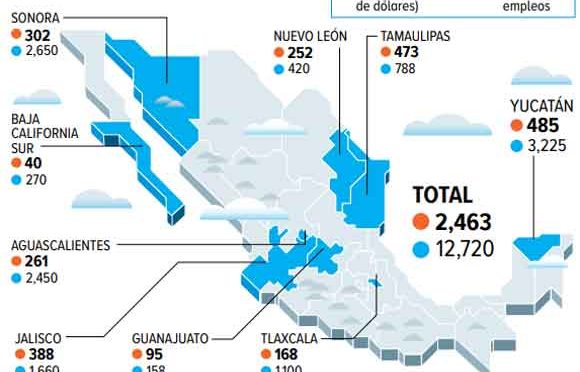At least 23 of 44 wind power and solar generation projects affected by recent policies that impeded their operation will be able to resume their pre-operational tests.
This, thanks to appeals filed against the Agreement to guarantee the efficiency, quality, reliability, continuity and security of the National Electric System, issued by the National Center for Energy Control (Cenace).
Said policy was justified by Cenace in the face of the damages derived from covid-19, since the federal government considered that the intermittent generation of wind and photovoltaic power plants would affect the reliability of the National Electric System. Given this, he gave priority to plants that use fossil fuels, such as fuel oil and coal.
Once notified of the amparos, Cenace allowed 23 projects to resume their tests; however, last night he informed that he will challenge the provisional suspension granted by a District court.
AMPAROS WILL ALLOW TO RESUME PROJECTS, WIND AND SOLAR ENERGY WORKS
Derived from the appeals filed against the Agreement to guarantee the efficiency, quality, reliability, continuity and security of the National Electric System, at least 23 of the 44 wind and solar generation projects affected by this policy may resume their pre-operational tests.
According to data from the Mexican Association of Solar Energy (Asolmex), the aforementioned agreement put at risk more than 6,400 million dollars in investments made for the construction of generator parks, thereby promoting the uncertainty that already prevailed in the sector.
The policy issued by the National Energy Control Center (Cenace) was justified by the effects that the covid-19 pandemic is causing, since the federal government considered that the intermittent generation of wind and photovoltaic power plants would affect the reliability of the System National Electric, giving priority to plants that use fossil fuels, mainly fuel oil, and even coal.
Given this situation, the private initiative and various civil and environmental organizations considered that this decision jeopardizes investments, the environment and fails to comply with the international commitments acquired by Mexico.
According to Asolmex, the agreement has negative repercussions on 44 projects, representing 50% of the new capacity that would come into operation in 2020, of which 28 photovoltaic and wind solar plants were ready to go into operation, and 16 under construction, backed for $ 6.4 billion in investments.
The measures will also imply monthly emissions of more than 714 thousand tons of CO2 that cannot be avoided, and put at risk about 29 thousand 517 jobs ”.
For this reason, the companies filed a series of legal remedies and were granted amparos in order to avoid being affected by this situation.
Therefore, Cenace instructed, by letter, to allow at least 23 of these projects to resume their preoperative tests.
The document made reference to the amparo lawsuits promoted against the aforementioned policy and which were notified to the regulatory body on May 19, where its suspension was decreed through various offices.
It should not be applied to complaining companies, as long as they do not affect the reliability of the National Electric System in the sense that they can generate cuts in the electricity supply ”.
It mentions that all those generators that, at the entry into force of the contested Agreement, were undergoing preoperative tests or that were already scheduled, must be granted the license to resume them.
Cenace assured that it was notified of the amparo lawsuits filed against the Agreement.
However, it will challenge the admission, provisional suspension and jurisdiction of the District Court, so it will make valid the legal instruments at its disposal.
Although the body is “attending and respecting” the judicial instruction, it considered that the decision made by the courts directly impacts the National Electric System (SEN), which “is reserved to the Mexican State as it is considered Strategic and Priority”, according to it is read in the Electricity Industry Law.
The operation of the SEN is out of commerce, so to establish it the Magna Carta in the invoked articles. For this reason, Cenace filed a complaint with the Collegiate Administrative Court for the protection it granted to the 23 projects so that they resume their tests.


